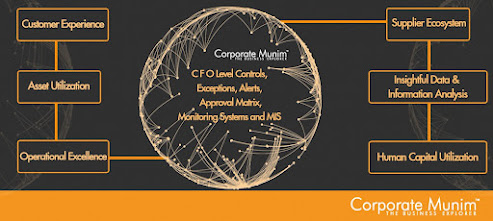Top Manufacturing ERP Software
In any manufacturing business, having a reliable and efficient ERP software is crucial to success. With so many different software options on the market, it can be difficult to choose the right one for your business. In this blog post, we will explore the top manufacturing ERP software options to help you make the best decision for your company. We will discuss the features and benefits of each software option, as well as pricing and support. By the end of this post, you will have all the information you need to choose the best ERP software for your manufacturing business.
What is ERP?
An enterprise resource planning (ERP) system is a software application that helps businesses manage their core operations, such as accounting, human resources, customer relationship management (CRM), inventory management, and supply chain management.
Corporate Munim-Enterprise Solution offers a centralized management solution for your business at affordable operational costs. Our Business Automation Solution ensures total business control and makes your company adaptable to any upcoming changes in regulations. Corporate Munim-ERP will give your company the required boost to exceed its competition.
ERP systems are designed to give businesses a holistic view of their operations in real-time, so they can make better decisions and optimize their processes. Most ERP systems are modular, meaning they can be customized to fit the specific needs of a business.
Corporate Munim covers each requirement related to manufacturing process. It ensures optimum utilization of all available resources and effective production of goods. It is a correct tool leading you to speedy economic growth.
· Productivity vs. Profitability
· Cost reduction through standardized and scheduled activities
· Control over the entire manufacturing process
· Need identification for materials and staffing
· Accountability distribution
· Handling issues and urgencies
While ERP systems were originally developed for manufacturing companies, today they are used by businesses in a variety of industries, such as health care, retail, and construction.
Types of ERP Software?
There are two main types of ERP software: On-premise and Cloud-based. On-premise software is installed on a company’s own servers, while cloud-based software is hosted by the ERP provider.
Both On-premise and Cloud-based ERP Software offer benefits and drawbacks. On-premise software is typically more expensive to purchase and maintain, but offers more control over the system and data. Cloud-based ERP systems are often less expensive and easier to set up and maintain, but may not offer as much control or customization.
The best type of ERP software for a company depends on its specific needs and budget. Companies should carefully consider their options before selecting an ERP system.
Why ERP Software is Important
ERP software is important for manufacturers because it can help them manage their businesses more effectively and efficiently. By automating tasks and processes, ERP software can help manufacturers improve their productivity and profitability. In addition, ERP software can help manufacturers track their inventory levels and customer orders, which can help them better manage their supply chain.
ERP functioning
An Enterprise Resource Planning (ERP) system is a software application that helps manufacturers manage and control their business operations. By integrating all of the data and processes related to manufacturing into one system, ERP software provides visibility into every aspect of the business and enables manufacturers to make more informed decisions.
ERP systems typically include modules for accounting, inventory management, order management, customer relationship management (CRM), and supply chain management (SCM). Some ERP systems also include human resources (HR) and project management modules. Manufacturers use ERP systems to track raw materials, finished products, and work-in-progress inventory levels. They also use ERP to manage supplier relationships, generate purchase orders, and track customer orders.
In addition to providing real-time visibility into all aspects of the business, ERP systems can also help manufacturers improve their overall efficiency and effectiveness. By automating key manufacturing processes and providing accurate data for decision-making, ERP systems can help manufacturers increase their production output while reducing waste and rework.
For more details:
Visit us at: https://corporatemunim.com
Contact us at: 07948080000
Email us at: sales@corporatemunim.com




Comments
Post a Comment